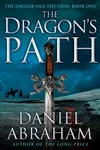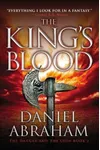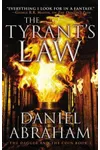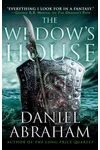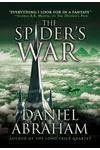Step into the mesmerizing world of The Dagger and the Coin, where dragons once ruled, and the clash of swords and coins shapes destinies! This five-book epic fantasy series by Daniel Abraham blends gritty political intrigue, economic warfare, and deeply human characters in a way that feels both fresh and timeless. If you love fantasy that challenges conventions and keeps you guessing, this underrated gem is calling your name.
Unlike traditional tales of chosen ones and epic quests, The Dagger and the Coin weaves a complex narrative around power, loyalty, and the ripple effects of choices. From a cunning banker to a flawed noble, its characters navigate a world teetering on the brink of chaos, making it a must-read for fans of George R.R. Martin or Joe Abercrombie.
How The Dagger and the Coin Began
Daniel Abraham, a prolific author known for The Expanse (co-written as James S.A. Corey), launched The Dagger and the Coin with a vision to reimagine epic fantasy. Inspired by medieval banking systems and historical power struggles, Abraham crafted a series that explores not just warfare but the economic forces behind it. The first book, The Dragon’s Path, hit shelves in 2011, introducing a world shaped by a fallen dragon empire and thirteen distinct human races.
Abraham’s goal was to blend familiar fantasy tropes with subversive twists, drawing from works like A Song of Ice and Fire and Medici Money. His knack for character-driven storytelling and worldbuilding shines through, creating a series that feels both intimate and expansive.
The Heart of The Dagger and the Coin
The series kicks off with The Dragon’s Path, where we meet Cithrin bel Sarcour, an orphaned banker navigating a cutthroat financial world, and Geder Palliako, a socially awkward noble whose actions spark unforeseen consequences. The King’s Blood deepens the political drama, as Geder’s rise to power fuels war and unrest, while Cithrin’s financial schemes reshape alliances. The Tyrant’s Law and The Widow’s House escalate the stakes, blending personal betrayals with a growing supernatural threat tied to the mysterious spider priests. The Spider’s War wraps it all up in 2016, delivering a finale that balances closure with lingering possibilities.
Themes of power, truth, and consequence dominate the series. Abraham uses the titular ‘dagger’ (military might) and ‘coin’ (economic influence) to explore how wars are won or lost, while his thirteen races—ranging from the pale Cinnae to the chitinous Timzinae—add vibrant diversity to the setting. The slow-burn pacing rewards patient readers with shocking twists and haunting moments, like Geder’s chilling decisions, which echo real-world complexities.
Abraham’s prose is hypnotic yet accessible, crafting vivid imagery without overwhelming detail. Fans praise the series for its strong female characters, like Cithrin and Clara Kalliam, who defy stereotypes through intelligence and resilience. The absence of graphic violence or sexual abuse also sets it apart, offering grimdark depth with a refreshing restraint.
Why The Dagger and the Coin Resonates
Though less flashy than blockbuster fantasy series, The Dagger and the Coin has carved a niche among readers who crave nuanced storytelling. Its blend of economic intrigue and political scheming feels strikingly modern, with themes of propaganda and power resonating in today’s world. Abraham’s ability to make banking thrilling—yes, really!—has earned it a cult following on platforms like Reddit, where fans call it one of the most underrated fantasy series of the decade.
The series’ legacy lies in its bold take on fantasy conventions, proving that epic tales don’t need dragons or chosen ones to captivate. Its influence lingers in the growing trend of character-driven, politically savvy fantasy, inspiring readers to seek out Abraham’s other works, like The Long Price Quartet.
- Publication Years: 2011–2016
- Number of Books: 5
- Setting: A post-dragon world with thirteen human races
- Notable Theme: The interplay of military and economic power
Grab The Dragon’s Path and dive into The Dagger and the Coin’s gripping world of intrigue and ambition! Whether you’re a fantasy veteran or a curious newcomer, this series promises a journey you won’t forget.
